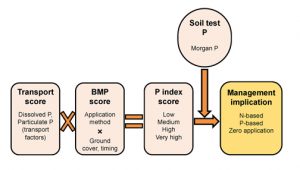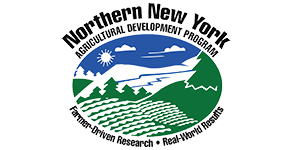
Canton, New York; November 9, 2020. Five farms in northern New York joined with producers statewide to contribute data to the Cornell University updating of the New York Phosphorus Index (NY-PI), a means of scoring farm fields to identify the risk of phosphorus (P) loss. As a testimony to the stewardship ethic of New York’s farmers, 90 percent of the 33,000 fields tested statewide for the NY-PI update had moderate soil test phosphorus levels below 40 lbs. P/acre where additional P is recommended for optimal crop growth.
The farmer-driven Northern New York Agricultural Development Program funded the regional NY-PI assessment as well as whole farm nutrient balance evaluations for farms in northern New York. The results of northern New York farms’ participation in the NY-PI 2.0 project and the Whole Farm Nutrient Balancing project are now posted at www.nnyagdev.org.
The NY-PI evaluation scored fields based on their risk of phosphorus runoff loss based on transport derived from factors such as proximity to streams or other watercourses, flooding frequency, soil erosion, and vegetated buffers. Best management practices to reduce the risk of P loss include how and when fertilizer and manure are applied, as well as the use of cover crops and manure-spreading setbacks.
New York’s farmers have made many changes including a significant reduction in fertilizer use resulting in improved whole farm P balances. The NY-PI 2.0 is valuable tool that builds on these successes and incorporates new science. It helps farmers, certified nutrient management planners, and natural resource managers with decision-making for optimal use of manure and fertilizer for agriculture environmental sustainability, efficient crop production, and sustainable farm business economics.
 Funding for the Northern New York Agricultural Development Program is supported by the New York State Legislature and administered by the New York State Department of Agriculture and Markets.
Funding for the Northern New York Agricultural Development Program is supported by the New York State Legislature and administered by the New York State Department of Agriculture and Markets.
The New York State Department of Agriculture and Markets, New York State Department of Environmental Conservation, and Natural Resources Conservation Service of the USDA were NY-PI 2.0 project partners with Cornell University. More information on the NY-PI 2.0 is posted at nmsp.cornell.edu/publications/pindex.html.